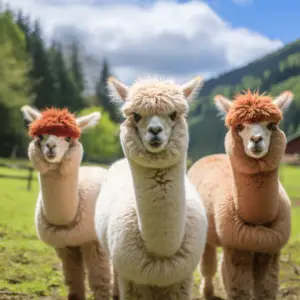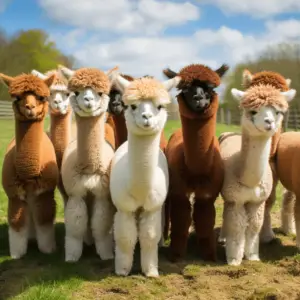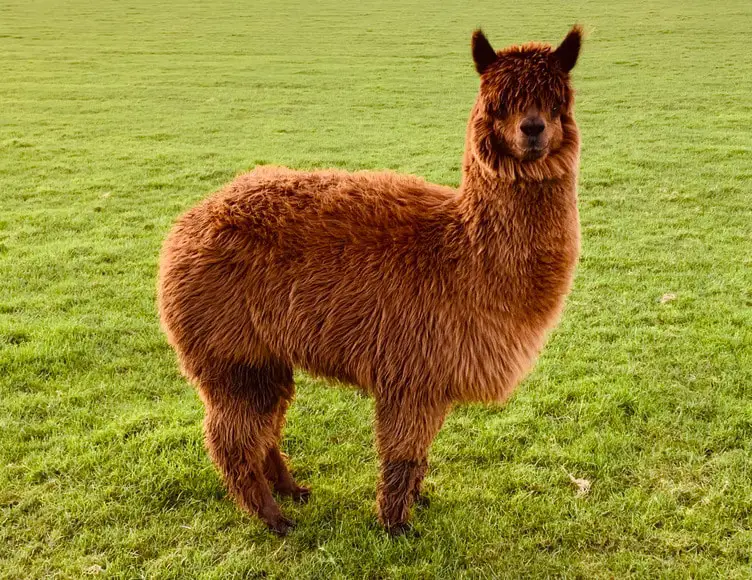Alpacas in Your Backyard, Ever stared at the gracious grin of an alpaca and wondered “can I have an alpaca in my backyard?” Well, the answer might surprise you.
Despite looking thin, tall, and cuddly creatures, it just so happens that alpacas are a lot like humans. These animals don’t do well when isolated and alone.
Since we can’t just give you a plain “yes or no” answer- we really have to kind of explore these creatures and what goes into homesteading with alpacas.
In case you’re in a hurry, however, what we can say quickly off the bat is that you can have alpacas in your homestead, but you need to be ready to take care of at least three of them.
This is because alpacas naturally need interaction associated with being with other alpacas. They are extremely cheap to keep as livestock, but one alpaca will get sick and probably die living alone. With only two, one will be a leader and the one will be suppressed; so, three.
Table of Contents
Can I Have An Alpaca In My Backyard? What You Need to Know

As you may have already figured out, homesteading with alpacas might not be the best idea. Not unless you actually have the space, time, and resources to support a small herd.
With a group of alpacas, let’s say three, you will have a leader- who should be a female- and the other two members of the herd who knows their role because hierarchy appears to be an important factor in their lives.
In fact, a lot of studies prove this to be true. A herd of three or more alpacas is likely to be happier and live longer because the camaraderie gives them happiness and security.
On the bright side, having alpacas in your homestead or backyard, for that matter, can bring an added dimension to your home.
When a person cares for animals, it gives an opportunity to experience the world from another perspective. Plus, we get to learn things about ourselves in the process.
Another important thing to note is that alpacas aren’t cheap to buy. But once you have them with you, there are a few upkeep considerations and veterinary costs to pay. This includes, deworming, cutting nails, shearing, and filling teeth regularly, that’s it.
Obviously, grass and freshwater are essential. These creatures are accustomed to poor quality grass but during winter, if there’s very little green for them to munch on, you may add hay to their diets.
For instance, you can supplement with pullets for an optimal diet with all the much-needed vitamins and minerals.
Alpacas as Pets
Alpacas were traditionally domesticated as livestock, not really as pets. That means they can still be a bit standoffish around people. They were originally found in South America, specifically in the region of the Andes Mountains in Peru.
Over the past years, alpacas have become even more popular in North America, as more and more people get alpacas as pets. Indeed, alpacas can be amazing pets while you take good care of them.
They are very similar to cats, and by this, we mean curious and intelligent. When you get closer to them, you may possibly have them eating out of your hand and this can create a window for you to teach them a few things.
However, unlike cats, one thing you should keep in mind is that alpacas don’t like to be held or cuddled. They are known to be very sensitive to any kind of touch. These animals aren’t meant to be propagated further; their main role as a pet is to extend companionship to you and your family.
There are pet-quality alpaca breeders who have alpacas for sale for about $500 per head. This is the initial purchasing fee-only involved in bringing a heard of alpacas to your backyard.
Alpacas come in different breeds, with Suri Alpacas and Huacaya Alpacas being two of the most common. Usually, pet-quality alpacas aren’t meant to be extended for further breeding. You shouldn’t expect them to reproduce for commercial purposes in which their own progeny are traded.
How Much Backyard Space do Alpacas Need?
Well, you don’t need a huge backyard. A herd of five alpacas needs around one acre of land. Of course, you could possibly keep up to ten animals on one acre, but you will need to provide them with hay at least once or twice per day, to satisfy their diet. Otherwise, grazing grass on one acre is limited space.
While these creatures mostly graze on alfalfa and fescue grass, you should ideally have a few different pastures where you rotate the herd. This will help to ensure they graze on the available fresh grass.
To prevent the spread of disease, the pasture should be cleaned at least twice per week. Smaller fenced pastures such as pens where alpacas are being groomed, watered, or given hay should be well-maintained and cleaned every single day.
Fences and Protection for Alpacas
Alpacas are not the kind of creatures to challenge boundaries. Meaning if you install fencing on your property, they are likely to stay put. In any case, creating a fenced perimeter for alpacas is important to keep off other animals who may be attempting to enter.
Subject to where you live, predators could include animals such as coyotes, bears, or mountain lions. It’s recommended that you install mesh fencing or a chain-link fence that is dense enough to keep other animals from getting through.
Veterinary Care for Alpacas

If you’re looking to have alpacas in your backyard, ensure that there’s a vet nearby who’s well experienced in how to take care of them. Alpacas are naturally susceptible to certain parasites and thus, they necessitate monthly checks to keep them healthy.
As mentioned before, veterinary care for alpacas will include regular checkups de-worming, clipping nails, and checking teeth. Also, alpacas can become vulnerable to certain diseases. You should, therefore, take notice if it seems like your alpacas are losing weight for no reason.
The Bottom Line
You can alpacas in your backyard. However, as we have seen, you need to make sure you get at least three of them at a time. Make sure there is an experienced veterinarian to provide the annual vaccinations for alpacas.
These vaccinations are generally considered “off label”, which means the effectiveness of the vaccines cannot be guaranteed by the manufacturers. And lastly, be sure to check everything needed for that with your local laws. Otherwise, if you have space, time, and resources, alpacas can be a perfect choice for a pet.


